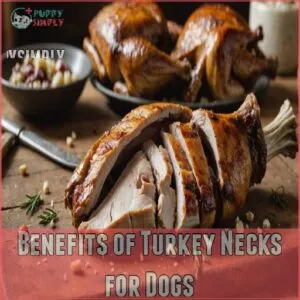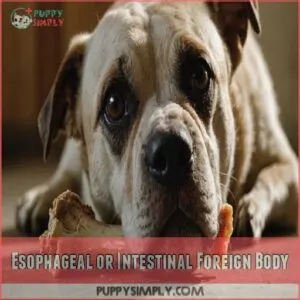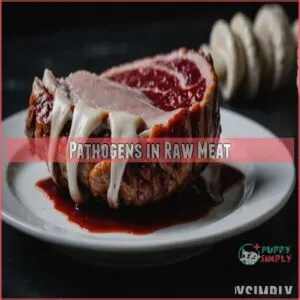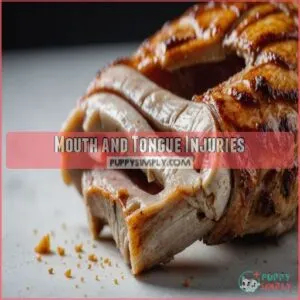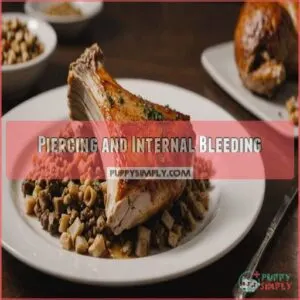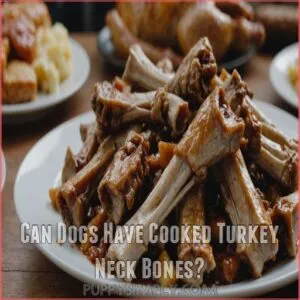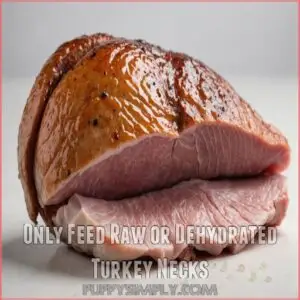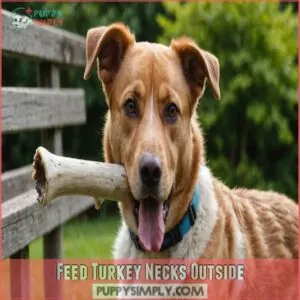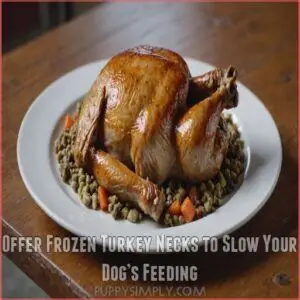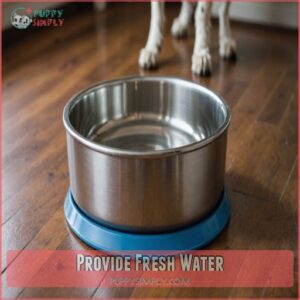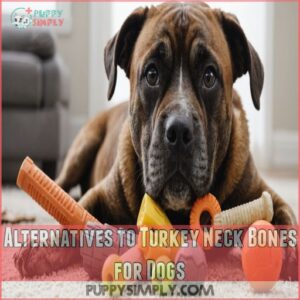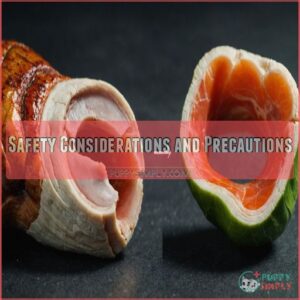This site is supported by our readers. We may earn a commission, at no cost to you, if you purchase through links.
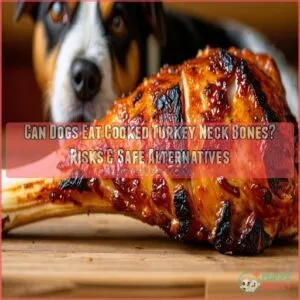 You might wonder if dogs can eat cooked turkey neck bones, but it’s a path best not traveled.
You might wonder if dogs can eat cooked turkey neck bones, but it’s a path best not traveled.
Cooked bones, like those from turkey necks, can splinter easily and pose a serious risk to your furry friend.
They can cause choking, intestinal blockages, or even internal injuries.
While it might seem tempting to toss your pup a tasty treat, raw or dehydrated turkey necks are safer options.
They’re less likely to splinter and can actually help with your dog’s dental health.
So, show your pooch some love and skip the cooked bones.
Curious about safe alternatives? We have plenty of ideas!
Table Of Contents
- Key Takeaways
- Benefits of Turkey Necks for Dogs
- Risks of Feeding Cooked Turkey Neck Bones
- Can Dogs Have Cooked Turkey Neck Bones?
- Feeding Turkey Necks Safely to Dogs
- Alternatives to Turkey Neck Bones for Dogs
- Safety Considerations and Precautions
- Frequently Asked Questions (FAQs)
- Can my dog eat a cooked turkey bone?
- Is it safe for dogs to eat neck bones?
- What is turkey neck syndrome in dogs?
- Can dogs have cooked chicken neck bones?
- How often can dogs eat turkey necks?
- What size turkey necks are best for dogs?
- Can turkey necks cause allergic reactions in dogs?
- How do I store turkey necks safely?
- Should I feed my dog frozen turkey necks?
- Conclusion
Key Takeaways
- Cooked turkey neck bones can splinter easily, posing choking hazards and risking serious internal injuries for your dog.
- Avoid feeding your dog cooked bones; they can cause digestive issues and should be replaced with raw or dehydrated options.
- Turkey necks provide nutritional benefits such as joint support and dental health, but always supervise your dog while they are chewing.
- If introducing new treats, consult your vet and opt for safe alternatives like bully sticks or dental chews.
Benefits of Turkey Necks for Dogs
When considering turkey necks for your dog, you’re looking at a treat packed with nutrients and enrichment.
They provide essential minerals, support joint health, and give your dog something to chew on, which can help clean their teeth and satisfy their natural instincts.
Joint Health and Glucosamine
Glucosamine in turkey necks boosts your dog’s joint health. Think of it as a natural joint support, easing joint pain, and keeping cartilage nice and healthy.
Here’s why: Glucosamine supplements, naturally found here, aid dog health.
For owners looking for alternative sources, consider glucosamine dog products.
Dental Health and Chewing Experience
So, you’re thinking about your dog’s joint health, right? Well, turkey necks offer more than just that! They’re also great for dental health. Chewing helps scrape away plaque.
| Benefit | How it Helps |
|---|---|
| Plaque Reduction | Natural teeth cleaning |
| Chewing Satisfaction | Keeps them busy and happy |
| Gum Health | Massages gums, improving circulation |
| Oral Hygiene | Reduces tartar buildup |
| Dog Dental Health | Improves overall mouth health |
Remember, always supervise your pup! Cooked bones are a no-go because they splinter, posing choking hazards. Prioritize dog safety!
Enrichment and Mental Stimulation
Chewing on turkey necks isn’t just great for dental health—it’s a brain booster too.
When Fido’s bored, watch the magic happen:
- Interactive feeding: Turns meal into a mind game.
- Dog puzzle toys: Keeps those gears turning.
- Chewing benefits: Naturally satisfies instincts, reducing anxiety.
Just remember, cooked bones pose safety risks, so stay cautious.
Nutritional Value and High Protein Content
While turkey necks certainly spark a dog’s interest, they also pack a punch nutritionally.
With high protein content, these necks support muscle growth and maintain a healthy coat and immune system.
Consider them a lean protein goldmine in your dog’s diet.
Remember, though, choking hazards and digestive issues can occur, so supervise Fido during snack time for added peace of mind.
Rich in Calcium, Phosphorus, and Other Minerals
You mightn’t know it, but turkey necks are loaded with calcium and phosphorus, essential for bone development and nutrient balance.
These minerals boost dog nutrition, offering health benefits while keeping turkey bones off the dinner table.
Just be aware that cooked bones like turkey neck bones can cause pancreatitis in dogs, similar to the risks associated with cooked chicken legs. Just watch out for dog health risks like constipation or vomiting.
It’s like giving Fido a natural, crunchy supplement!
Risks of Feeding Cooked Turkey Neck Bones
Feeding cooked turkey neck bones to your dog can seem like a tasty option, but it poses significant risks.
These bones are prone to splintering, which can lead to choking or serious internal injuries.
Choking and Constipation
Crunching on turkey necks is great, but cooked bones spell trouble. They can lead to choking and constipation, making meal times risky for your pup.
Remember to:
- Check for signs of choking
- Choose appropriate bone size
- Explore safe alternatives like bully sticks
- Keep an eye on their stool for changes
These simple steps can prevent dog choking hazards and intestinal blockages.
Esophageal or Intestinal Foreign Body
Cooked turkey bones can lead to a dog’s digestive drama worthy of a vet’s script.
Bits might form an esophageal foreign body or cause an intestinal blockage, which is why veterinarians recommend caution and suggest alternatives like pork bones instead.
Signs of trouble include coughing, gagging, or loss of appetite.
Diagnosis is often tricky, so prevention’s the best treatment.
Pathogens in Raw Meat
A significant worry with raw turkey bones is the presence of harmful bacteria.
Even though you’re cooking the bones, remember that raw meat can harbor nasty pathogens.
Here’s what you should know:
- Salmonella risk: This bacteria can cause serious illness.
- Parasite concerns: Certain parasites can survive cooking.
- Bacteria in raw meat: Proper handling and cooking are essential to minimize risks.
Always prioritize your dog’s safety!
Mouth and Tongue Injuries
Imagine feeding turkey bones leading to sharp bone splinters, which can turn into a dog’s worst nightmare.
These splinters can cause dog mouth cuts and tongue injuries, resulting in bleeding and pain.
Always consider mouth injury prevention with a focus on veterinary care for dog emergencies.
Here’s a quick look:
| Risk | Solution |
|---|---|
| Dog mouth cuts | Supervise bone chewing |
| Sharp bone splinters | Opt for raw turkey bones |
| Bleeding and pain | Keep contacts for emergency care |
| Dog choking hazards | Choose bone size carefully |
| Mouth and tongue injuries | Monitor chewing habits |
Piercing and Internal Bleeding
Mouth injuries are just the tip of the iceberg.
Piercing and internal bleeding from turkey bones can spell trouble.
Here’s why:
- Bone splinter risks puncture organs, causing chaos.
- Watch for internal injury signs like dog vomiting or constipation.
- Potential vet emergency if symptoms appear.
- Stick to bone safety tips for peace of mind.
Better safe than sorry!
Can Dogs Have Cooked Turkey Neck Bones?
You might think treating your furry friend to a cooked turkey neck bone is a special way to celebrate the holidays, but it’s not a good idea.
Cooked bones can be brittle and splinter easily, leading to serious internal injuries for your dog.
No, Cooked Turkey Neck Bones Are Not Safe
You’re giving your dog a delicious treat, but cooked turkey neck bones can quickly turn into a nightmare.
They’re not safe because these turkey bones can splinter easily, posing serious splintering risks.
This leads to dog choking hazards or worse.
Stick to raw options to avoid dog digestive issues, and consider choosing safe alternatives to pork bones that are designed to provide a similar chewing experience without the risks, potential constipation, and make sure you provide safe dog treats and proper nutrition.
Reasons for Avoiding Cooked Bones
Cooked turkey neck bones aren’t safe for your dog.
As the previous concerns point out, these bones can lead to serious issues.
Here’s why you should skip them:
- Choking Hazard: They can easily get stuck in your dog’s throat.
- Internal Injuries: Sharp edges can cause painful tears.
- Digestion Issues: They may lead to constipation and gastrointestinal problems.
Cooked Bones Are Brittle and Splinter Easily
Imagine your dog chewing on cooked turkey bones; it might feel safe, but those bones are brittle and splinter easily, posing a significant risk of splintering and puncturing a dog’s digestive tract, such as the esophagus, stomach, or intestines.
This can lead to severe internal injuries or blockages, as noted in the risks associated with cooked chicken bones.
Splintered Bones Can Cause Internal Injuries
That brittle nature means cooked turkey bones splinter easily.
These sharp bone splinters are a serious choking hazard, and, even worse, they can cause internal injuries.
Think tiny, razor-sharp pieces piercing your dog’s insides.
Considering the health risks associated with human foods like hot dogs, which are high in fat and calories and contain unhealthy additives like sodium nitrate and MSG, Instead of risking your dog’s health, consider opting for healthy dog treats.
Best dog treat options can be a great alternative to bones.
Feeding Turkey Necks Safely to Dogs
When feeding turkey necks to your dog, it’s important to stick to raw or dehydrated options for safety.
Supervise your pup when they are eating turkey necks.
Offer turkey necks outdoors to minimize mess.
Always have fresh water close by just in case they get thirsty.
Only Feed Raw or Dehydrated Turkey Necks
When choosing turkey necks for dogs, they should provide high-quality protein, trace minerals, and essential vitamins, as seen in benefits of turkey necks. When choosing turkey necks for dogs, go with raw or dehydrated options.
Cooked turkey bones for dogs can splinter, posing a choking hazard.
The dehydration process preserves nutrients and makes the necks safer to chew.
Raw turkey necks contain glucosamine and chondroitin, which help support joint health benefits, offer benefits like joint support, whereas cooked ones risk causing dog constipation.
Remember, bone safety’s key to happy, healthy pups!
Feed Turkey Necks Outside
You’ve opted for raw turkey necks, a wise choice for dog nutrition.
Now, consider taking them outdoors!
Feeding turkey necks outside reduces the bacteria spread around your home, and yard cleanup is less hassle.
Outdoor safety means keeping an eye on your pup, preventing dog constipation from overeating, and ensuring bone disposal is dog-friendly and hygienic.
Feed by Hand if You Have a Gulper
Gulpers can turn meal times into a game of speed eating, which isn’t always safe.
To help, feed turkey necks by hand.
This helps promote safe chewing and minimizes choking hazards.
Here’s how:
- Hold the neck firmly for supervised chewing.
- Encourage slow bites—patience is key.
- Look out for signs of distress or choking.
Offer Frozen Turkey Necks to Slow Your Dog’s Feeding
Instead of feeding by hand, try giving your dog frozen turkey necks to slow their munching pace.
These frozen treats are ideal for dog gulpers who need a bit of encouragement to chew more mindfully.
By using frozen necks, you promote slow eating, ensuring safe chewing and a happier feeding experience.
Remember to think about bone size to match your dog’s needs.
Provide Fresh Water
A dog’s hydration is as important as a fish’s need for water!
Provide fresh water when feeding your dog turkey necks.
Consider these tips:
- Water bowl size matters—ensure it fits your dog’s needs.
- Maintain water quality by cleaning regularly.
- Adjust water frequency to your dog’s intake.
- Smart water bowl placement prevents spills.
Prioritize these for a happy, hydrated pup.
Alternatives to Turkey Neck Bones for Dogs
So, you’re looking for safer chew toys than turkey neck bones?
Fortunately, there are plenty of delicious and safe alternatives available for your furry friend, from bully sticks to dental chews, that provide similar benefits without the risks.
Dog-Friendly Treats and Chews
Variety spices up life—your dog thinks so too.
When choosing the perfect snack, remember that even raw turkey necks can be a healthy option if done correctly, but cooking risks can lead to splintering and cause harm.
Swap out turkey necks for safe snacks like bully sticks or dental chews, which boost dental health and enrich their dog.
Leftover Turkey Meat
What’s better than discovering a safe, tasty treat for your doggy?
Leftover turkey meat—sans bones—is a fantastic, protein-rich option.
Remember, though, a little goes a long way!
This delicious addition to their dog food recipes shouldn’t trump their regular balanced diet.
Keep storage tips in mind, and make sure it’s safe for puppies.
Your pooch will wag with delight!
Safe Human Food for Dogs
After storing leftover turkey meat safely, you might wonder about other table scraps that fit a dog’s diet.
There’s plenty of human-safe dog food around.
Think apple slices or cooked carrots, which are on the safe treat list.
However, always avoid turkey bones to prevent choking.
Stay cautious, ensuring snacks are dog-safe, skipping anything risky.
Bully Sticks and Dental Chews
So, you’ve looked into safe human foods for your pup, but you may be surprised to learn that even certain treats like ham can be hazardous due to their high sodium content, but what about chews?
Bully sticks and dental chews offer fantastic alternatives to turkey neck bones.
They’re designed to satisfy your dog’s chewing instincts while promoting dental health.
Plus, they’re safer than bones, reducing risks of choking.
Always keep an eye on your furry friend when trying new chew options!
Safety Considerations and Precautions
Regarding turkey neck bones, you should stick to raw, freeze-dried, or dehydrated options since cooked bones can splinter and harm your dog.
Whole poultry parts like turkey necks provide safe chewing experiences, but always keep an eye on your pup during treat time to make sure they’re safe.
Raw, Freeze-dried, or Dehydrated Poultry Bones Are Safe
Thinking about alternatives for turkey necks?
Raw, freeze-dried, or dehydrated poultry bones might be your answer.
They offer safer Bone Preparation Methods, keeping Bone Safety Concerns at bay.
Unlike cooked bones, they don’t splinter easily, reducing Dog Digestive Issues.
However, always consider the Raw vs. Cooked debate.
Keep your dog’s diet balanced and consult your veterinarian for the best dog veterinary care.
Cooked Poultry Bones Should Never Be Given to Dogs
Unlike raw bones, cooked poultry bones, including turkey bones, are incredibly dangerous for your dog.
They become brittle and splinter easily, posing a serious threat.
These splinters can cause painful injuries in your dog’s mouth, throat, or even intestines.
The splintering risk is simply too high.
For bone safety and your dog’s health, choose safer alternatives like bully sticks.
Remember, a healthy dog is a happy dog!
Always prioritize your furry friend’s well-being.
Consult your vet with any concerns regarding your dog’s diet.
Whole Poultry Parts Like Turkey Necks Are Safe Chews
As you explore dog-friendly chews, turkey necks can be a safe choice.
They’re rich in protein and minerals, enhancing dog enrichment while satisfying chewing instincts.
Considerations include:
You can find a variety of turkey neck dog chews available online, such as dehydrated turkey necks.
- Turkey neck size: Make sure it’s
Supervise Dogs When Feeding Bones
Keeping an eye on your dog while they chew bones is very important.
It’s about preventing choking hazards but also making sure the bone size suits their chomping style.
Safe chewing equals happy dogs, so supervision tips can save you a trip to the vet.
Explore alternative treats if raw turkey bones seem risky.
Your furry friend’s well-being is key!
Frequently Asked Questions (FAQs)
Can my dog eat a cooked turkey bone?
Cooked turkey bones aren’t safe for dogs.
They can splinter easily, causing choking or injuries.
It’s better to steer clear of cooked bones entirely.
Opt for dog-safe chews like bully sticks to keep your pup satisfied and safe.
Is it safe for dogs to eat neck bones?
Your dog shouldn’t eat cooked neck bones because they can splinter, causing injuries or blockages.
Cooked neck bones are a no-go for your furry friend.
If you really want to treat them, stick to raw or dehydrated options.
Always check with your vet before introducing new treats.
What is turkey neck syndrome in dogs?
Ironically, there’s no known "turkey neck syndrome" in dogs. Don’t worry, it’s likely a misunderstanding. Focus on safe treats instead; always consult your vet for dietary advice.
Can dogs have cooked chicken neck bones?
Feeding cooked chicken neck bones to dogs is risky.
These bones can splinter easily, causing injuries to your dog’s mouth, throat, or intestines.
Raw bones might be safer but still pose choking and digestive problems.
Always consult your vet.
How often can dogs eat turkey necks?
Feed turkey necks to your dog once or twice a week as an occasional treat, ensuring they’re raw or dehydrated.
Always supervise during feeding to prevent choking.
Consult your vet for personalized guidance based on your dog’s health.
What size turkey necks are best for dogs?
Choosing the right size turkey neck for your dog depends on their breed and chewing habits.
Large dogs handle full-sized necks well.
Smaller dogs might benefit from turkey hen necks or even duck or chicken necks.
Can turkey necks cause allergic reactions in dogs?
Yes, turkey necks can trigger allergic reactions in some dogs, especially if they’re sensitive to certain proteins.
Watch for signs like itching, swelling, or digestive issues.
Always introduce new foods gradually and monitor your dog’s response.
How do I store turkey necks safely?
When keeping turkey necks fresh as a daisy, store them in the fridge or freezer.
Thaw completely before feeding.
Always handle with clean hands.
This way, your furry friend enjoys safe, delicious, and bacteria-free treats!
Should I feed my dog frozen turkey necks?
Feeding frozen turkey necks to your dog can be beneficial, slowing down their eating and providing a good dental workout.
Just keep an eye on them while they chew to prevent any potential choking hazards.
Conclusion
So, there you have it: can dogs eat cooked turkey neck bones? The short answer is a resounding no.
Remember, those cooked bones are like tiny, dangerous landmines in your dog’s digestive system.
Stick to raw or dehydrated turkey necks for a safe and satisfying chew. Your dog’s tummy (and your peace of mind) will thank you.
Always supervise your pup during playtime with chews, and if you’re ever unsure, consult your vet. They’re the bone experts!

